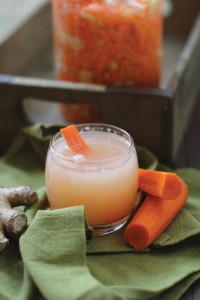The Buzz About Fermentation
DIY fermentation creates helpful, nourishing foods
Written by Julia Mueller
There is a buzz around fermentation in every sense of the word, and it goes beyond bread, beer and cheese. Have you noticed an upsurge in people hovering around the kombucha display at the grocery store? Perhaps you have even pickled your own ginger or dabbled in homemade yogurt? Amidst the growing do-it-yourself hubbub, at-home fermentation is quite literally a growing culture, creating some of the most nourishing food and drinks a person can consume.
Fermentation 101
Fermentation is the process of yeasts and/or bacteria multiplying as they convert sugar into acid and alcohol. It is an ancient tool used in civilizations worldwide to produce shelf-stable food and drink. We have all been known to get cozy with fermentation right around the 5 p.m. hour following a long day. But haste: There is more to it than hops and grapes. Alcohol may be a byproduct of fermentation, but so are healthful acids, probiotics and yeasts.
Probiotic organisms are naturally present in raw foods such as grains and fresh produce, and are also in the air. In short, helpful bacteria and yeasts are everywhere. When placed in an optimal sanitary environment with a friendly temperature and enough fuel (sugar) to feed on, most raw whole foods can ferment into a nutrient and probiotic-rich elixir.
One of the simplest ways involves adding fresh whole or chopped vegetables, a pinch of salt and water to a large jar, covering it in cheesecloth and letting it sit in the pantry for a couple of weeks to allow the microorganisms indigenous to the vegetables to feed off the natural sugars. This results in a food (and drink) rich in probiotics, vitamins, minerals and enzymes. Pickles, sauerkraut, yogurt and kimchi take the cake for some of our favorite fermented foods.
These foods and probiotic supplements can be purchased from the store, but many people are now making them at home. For better or worse, with industrialization comes sterilization. Many store-bought fermented foods are pasteurized, which denatures the probiotics, yeasts and enzymes. Unless a label specifically mentions the presence of active cultures, it does not contain probiotics. Carnelian Bay–based dietician Maria Martin MPH, RD, explains fermented foods contain a wider variety of bacteria strains than supplements, although there is still debate as to which source is more effective.
Health Benefits of
Fermentation
Perhaps the most exciting part about fermented whole foods is they contain probiotics. Probiotics promote efficient digestion by achieving healthy gut flora and changing the way our bodies process food, Martin says. Martin recommends her patients with digestive complaints such as irritable bowel Syndrome introduce probiotics through food or supplements to their diets.
Lynn Norton MS, RD, a dietitian based in South Lake Tahoe, adds, “probiotics prevent bad bacteria from attaching to the gut, which starves them of the nutrients they need to survive.”
Fermented foods may help prevent inflammatory bowel disorders, diarrhea, gastrointestinal and other infections, as well as allergic reactions to food, but it is not enough to consume them every once in a while, Norton says. Because some of the probiotics die during digestion, one must regularly consume fermented foods or probiotic supplements so that healthful bacteria continually populate the digestive system.
Not only are fermented foods beneficial to our digestive systems, they are also easy to digest. Fermented food is considered “predigested” because the starches and sugars in the food are consumed by the probiotics, leaving very little residual sugar for the stomach to digest. This creates less work for the pancreas, which is responsible for secreting digestive fluids.
Priobiotics also create lactic acid, which prohibits harmful bacteria growth. Having an imbalance of stomach acid can result in digestive problems, but lactic acid can either increase or decrease stomach acid to create a balance that is favorable to proper gut function. As people age, the presence of digestive enzymes decline, which is why doctors tend to recommend fermented foods or probiotic supplements to older patients
Wine and beer are fermented, but don’t contain probiotics. The drinks are fermented using yeasts, which die from alcohol poisoning once the alcohol content reaches a certain level. Wine and beer have health benefits of their own, but they are dwarfed in comparison to other fermented drinks. In essence, not all fermented foods are created equally. Those with the highest density of health benefits are fermented vegetables and probiotic beverages.
Probiotic drinks such as kombucha, ginger beer, kefir and lacto-fermented beverages contain high amounts of B vitamins and multiple strands of probiotics and yeast. They are fermented for less time than wine and beer, yielding much less alcohol and ensuring the probiotics survive. If you have turned your nose up at the price tag on kombucha, you can take comfort in the fact that brewing probiotic drinks at home is much more cost effective than purchasing them from the store.
While fermented foods have been touted as healthful, Norton cautions they are not for everyone. Cancer patients, or those infected with HIV or other autoimmune diseases should use caution or exclude fermented foods from their diets, as a low-microbial diet is recommended for those who have repressed or sensitive immune systems. Molds found in fermented foods, non-pasteurized juices and milks, and uncooked vegetables and fruits should be avoided by those groups, which eliminates fermented foods. Similarly, pregnant women need to use caution and consult a doctor prior to consuming fermented foods and drinks.
Author Julia Mueller recently published a cookbook called Delicious Probiotic Drinks, which includes recipes for naturally fermented beverages. During the writing, she learned quite a bit about the process of fermentation and experienced the health benefits first-hand.
Category: Home & Garden, Wine & Dine







